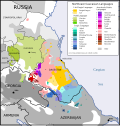In grammar, the lative (/ˈleɪtɪv/ LAY-tiv; abbreviated LAT) is a grammatical case which indicates motion to a location. It corresponds to the English...
8 KB (1,234 words) - 18:40, 17 December 2023
stand in the dative/lative case. In this example the "pure" dative/lative without its POSS-suffix is used. ГIалир ʻAli-r Ali-DAT/LAT ПатIи Patʼi Fatima:[II]:ABS...
39 KB (5,062 words) - 17:06, 9 May 2025
locative grammatical case. The term allative is generally used for the lative case for the majority of languages that do not make finer distinctions. For...
5 KB (620 words) - 05:19, 19 September 2024
known as the accusative of place to which, and is equivalent to the lative case found in some other languages. as the subject of an indirect statement...
16 KB (1,899 words) - 15:59, 4 May 2025
speech act which causes the hearer to take a particular action Lative case, a grammatical case that indicates direction All pages with titles containing directive...
576 bytes (108 words) - 16:04, 22 September 2022
lative case, indicating a motion to a location. 日本に行きたい。 Nihon ni ikitai "I want to go to Japan." However, へ e is more commonly used for the lative case...
95 KB (10,869 words) - 16:11, 4 May 2025
list of grammatical cases as they are used by various inflectional languages that have declension. This list will mark the case, when it is used, an...
34 KB (336 words) - 14:24, 3 April 2025
However, there are also primary postpositions which can govern the lative case. The word order in Kamas is SOV (subject-object-verb), but the word order...
21 KB (1,659 words) - 03:24, 14 May 2025
Khanty languages (section Cases)
Nominative case Accusative case Dative case Lative case, merger of differentiated local cases that is used to indicate relative location. Locative case Used...
30 KB (2,305 words) - 21:37, 10 May 2025
and "by". The locative case belongs to the general local cases, together with the lative and ablative case. The locative case exists in many language...
34 KB (4,133 words) - 16:54, 4 May 2025
Rules. Some authors use a lower-case n, for example nH for 'non-human'. Some sources are moving from classical lative (LAT, -L) terminology to 'directional'...
152 KB (3,532 words) - 09:13, 18 April 2025
form -ona, which means "Towards" (Lative case). -o and -ni combine to form -oni, which means "From" (Ablative case). Example usages can be "Anga Turaoni...
23 KB (2,697 words) - 05:22, 6 May 2025
Tsez language (section Case)
dative/lative case (ending in -(e)r), if it's a non-permanent transfer (e.g. "to lend") or if it's incomplete, the recipient takes any of the locative cases...
62 KB (7,028 words) - 14:02, 14 April 2025
Alyutor language (section Case roles)
instrumental case, and as the argument of an antipassive clause. The locative is used for position and direction (essive and lative cases), as well as...
17 KB (1,351 words) - 23:07, 27 March 2025
A grammatical case is a category of nouns and noun modifiers (determiners, adjectives, participles, and numerals) that corresponds to one or more potential...
77 KB (7,079 words) - 21:50, 5 May 2025
grammar, the nominative case (abbreviated NOM), subjective case, straight case, or upright case is one of the grammatical cases of a noun or other part...
7 KB (817 words) - 22:06, 29 December 2024
lative -(i)ka (lat) and abl -ax (abl), marking roughly location/placement, direction/towards and point of departure, respectively. The lative case appears...
47 KB (3,562 words) - 00:51, 13 March 2025
Tupari language (section The Tuparí case system)
lot of people where you are, in your house?’ : 71 The instrumental-lative case marker has two meanings, notably that it demonstrates the instrument...
31 KB (3,994 words) - 20:25, 1 January 2025
1952 in Kannus. He obtained his PhD in 1967 with a thesis about the lative case in Mari and served as professor of Finno-Ugric linguistics at the University...
3 KB (226 words) - 11:43, 12 January 2023
In grammar, the elative case (abbreviated ELA; from Latin: efferre "to bring or carry out") is a locative grammatical case signifying that something comes...
3 KB (332 words) - 14:11, 23 March 2025
and seven cases in Enets: the nominative, genitive, accusative, lative, locative, ablative and prolative case. The meaning of those cases is expressed...
33 KB (2,697 words) - 13:21, 22 April 2025
In grammar, the intransitive case (abbreviated INTR), also denominated passive case or patient case, is a grammatical case used in some languages to mark...
1 KB (146 words) - 10:51, 8 December 2024
The distributive case (abbreviated DISTR) is used on nouns for the meanings of 'per' or 'each.' In Hungarian it is -nként and expresses the manner when...
2 KB (205 words) - 02:43, 5 April 2024
In grammar, the genitive case (abbreviated gen) is the grammatical case that marks a word, usually a noun, as modifying another word, also usually a noun—thus...
36 KB (4,427 words) - 13:29, 14 May 2025
An adessive case (abbreviated ADE; from Latin adesse "to be present (at)": ad "at" + esse "to be") is a grammatical case generally denoting location at...
5 KB (673 words) - 09:21, 28 April 2025
grammar, the instructive case is a grammatical case used in Finnish, Estonian, and the Turkic languages. In Finnish, the instructive case is used to indicate...
3 KB (261 words) - 17:48, 16 December 2023
A direct case (abbreviated DIR) is a grammatical case used with all three core relations: both the agent and patient of transitive verbs and the argument...
3 KB (394 words) - 13:15, 17 January 2025
adverbial case (abbreviated ADV) is a noun case in Abkhaz and Georgian with a function similar to that of the translative and essive cases in Finnic languages...
2 KB (197 words) - 23:23, 7 June 2024
In grammar, the inessive case (abbreviated INE; from Latin: inesse "to be in or at") is a locative grammatical case. This case carries the basic meaning...
5 KB (497 words) - 16:36, 4 May 2025
In grammar, the delative case (abbreviated DEL; from Latin: deferre "to bear or bring away or down") is a grammatical case in the Hungarian language which...
2 KB (249 words) - 19:37, 25 October 2024









